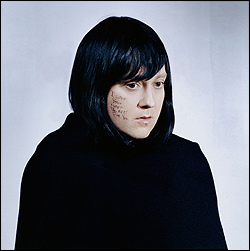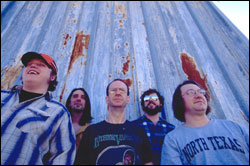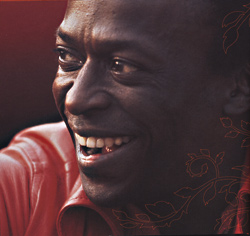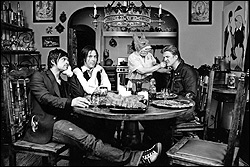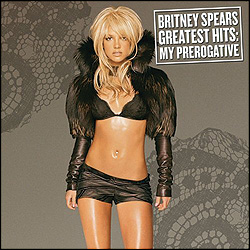There are voices that bug the shit out of you and then there are voices that bug the shit out of you, if you get my drift. Some types of singing (let’s call them Type A) inspire an immediate physical repulsion, while others (Type B) simply hint at a distasteful or just plain silly worldview. Type A: the Arcade Fire, whose Anglophiliac frontman can drive me from a room faster than any singer since the Counting Crows’ “Round Here” was making its play for ubiquity. Type B: Antony & the Johnsons, a showcase for a lushly off-putting androgyne with no surname who’s coy about whether he means to arouse empathy, adoration, or maybe just pity.
But peer pressure will out, as ever, and enough smart acquaintances responded to either voice for me to reinvestigate. That’s a good habit anyway—even more than defining why we love what we love, scrutinizing why we hate what we hate forces us to denaturalize assumptions. After all, “instant physical repulsion” isn’t encoded into anyone’s DNA—it’s based on aesthetic choices that have been internalized so fully they can front like they’re all biological. And lo, the 47,000 members of the Arcade Fire did indeed lace a pretty enough lattice of strings and accordion and indie guitar on Funeral (Merge) to occasionally prevent singer Win Butler from collapsing center stage in a lump of Andrew Lloyd Mangum histrionics.
But questioning assumptions doesn’t mean discarding them. And nothing on Funeral convinces me that Butler’s musical-theater stylizations are as versatile a means of transmitting felt emotions as, for instance, my personal fave indie trick of coaxing an idiosyncratic musicality from one’s speaking voice. That method, subjected to countless permutations since Lou Reed got the ball rolling ages ago, works not because it’s “real” or “natural” (what do you take me for?) but because its form taps into a wider range of humor and loss and optimism and pain. Stagey whines, on the other hand, require a superhuman ability to wrest something personal from its all-too-fixed conventions, or a listener’s instantaneous acceptance of those conceptions at face value. And in this context, Butler ain’t even off Broadway—he’s just off.
Designed for smaller rooms, Antony’s shtick is potentially even more embarrassing. No wonder so many fans I know have tagged a pointed caveat onto their raves about I Am a Bird Now (Secretly Canadian): They usually don’t go in for this sort of thing. “This,” after all, is gender-bending cabaret pop, and “they,” for the most part, are rockers—in a less enlightened age, they might have been obligated to disparage this album as fruity. Not even fey, with that hint of playful sexuality—Antony’s Tiny Tim–isms are too earnest in their castrato yearning to allow for anything but the most sincere appreciation. You take his preciousness as is or not at all.
But while preciousness has always struggled for a place in rock, falsettos have a grand tradition of shamelessly ridiculous beauty. There’s none of the seducer’s adult sexuality to Antony’s high register; he aches upward with the preadolescent longing of doo-wop. Still, the shakiest street-corner swoon rested on bedrock harmonies, and the most helplessly virginal dreamers at least lusted after lust. Antony wobbles with naked effort around each note rather than floating upward, and he sees fragility and purity not as conditions to be overcome but as states of being to aspire to. On songs like “For Today I Am a Boy” (“Someday I’ll grow up and be a beautiful woman”), he captures the sound of a man yearning impossibly backward toward his own prettification.
At roughly 35 minutes, I Am a Bird Now is actually too long, padded by a series of unsuccessful duets. Boy George’s understated soul, Rufus Wainwright’s diva spotlight hogging, Lou Reed’s deadpan recitation, Devendra Banhart’s fatuous freak flagging—any second voice distracts from Antony’s careful exertion of beauty. He’s similarly hard to take live, a hairy lump of a man hunched over a piano, inadvertently transforming harmless banter such as “Is anyone here on a date?” into something disconcerting and lecherous. His art belongs on disc, where his music strives to be bodiless, to exist only as sound, to be coddled in the dynamic string arrangements of Maxim Moston and Julia Kent.
By contrast, the Arcade Fire’s music makes more sense live, as an artifact from an urban folk culture, forged from shared formative experiences, set forth as a bohemian social experiment. I called them “full of shit” in a review once, and I shouldn’t have—it saddles their thoughtful if unsuccessful project with undeserved implications of deception or delusion. Although I’ve got nothing against vampires or xylophones, there’s a reason each has had a more limited role in popular music than the band’s fans might wish. Anyway, I hope to put off school plays till I have kids. Because Antony’s project is so private and fantastic, it’s both less utopian and more than what the Arcade Fire is playing at. To really hear that band, you’ve gotta be a believer. Antony, though, is impossible to believe, so I can merely wish him well and admire him from a distance.
Antony & the Johnsons play On the Boards with Devendra Banhart, CocoRosie, and William Basinski at 8 p.m. Fri., April 22– Sat., April 23. $25/$27. Useful Noise will appear every three weeks.
